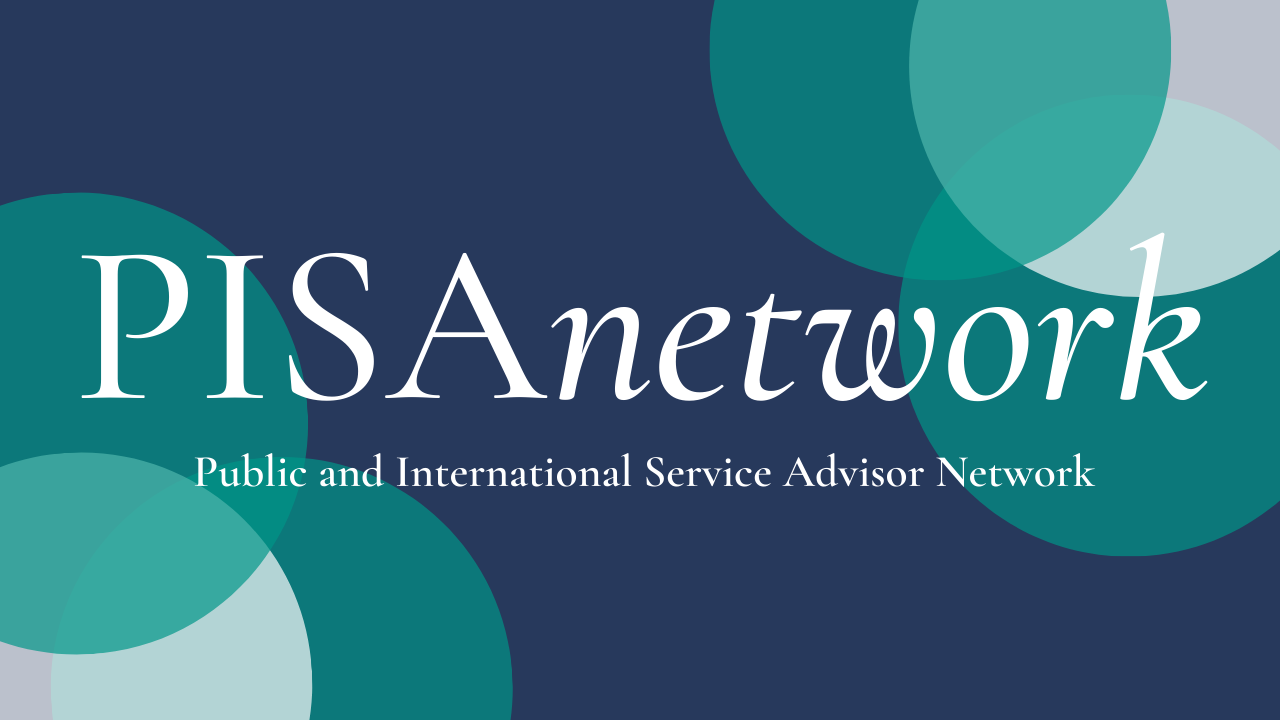APSIA Welcomes 80 New Public and International Service Advisors
From March 7-10, 2023, APSIA welcomed 80 advisors to the 2023 Public & International Service Advisor (PISA) Spring Training Workshops.
Recordings of the week’s sessions can be found on APSIA’s YouTube page.
Agenda
Tuesday, March 7 kicked the week off with a look at the many career opportunities within international affairs. Liz Brailsford, President & CEO, World Affairs Council of Dallas/Fort Worth (UMN HHH Alumna), hosted a conversation between Kyle Ojima, Foreign Affairs Officer for the US Department of State (DU JKSIS Alumnus), Isabel Sitcov, Manager at the C40 Centre for City Climate Policy & Economy (JHU SAIS Alumna), and Zachary Strauss, Policy Analyst at Atlas Public Policy (Sciences Po PSIA Alumnus). Speakers came from different parts of the US, but their paths into international affairs all included language study, a curiosity about the world, and time abroad. They also included time managing a restaurant, working at Target, and teaching English. These diverse experiences helped speakers see what they wanted and what they did not want in their international affairs careers.
Wednesday, March 30’s conversation between Marina Bruce, Assistant Director of Admissions & Operations at University of California, San Diego School of Global Policy & Strategy, and David Sheridan, Director of Financial Aid at Columbia University School of International & Public Affairs, focused on comparing graduate degrees and discovering ways to make graduate school accessible and affordable. Moderated by Sharon Swabb, Chief Program Officer for Fellowships & Career Development at Robertson Foundation for Government (UCSD GPS Alumna), speakers shared that programs in international affairs provide students with an interdisciplinary, global point of view (including economics, business, political science, etc). Public policy programs will be more “inward looking” at the domestic US public sector and the local level, often through quantitative analysis. Both degrees, however, serve students passionate about "solving the issues of the day."
On mapping financial aid, speakers emphasized that prospective students should "go all in on planning," even before they apply to graduate school. Advisors should counsel students to ask about the cost of attendance and living, as well as whether to attend part-time or full-time. Speakers also recommended that students contact the school’s financial aid office as an overarching resource of internal and external possibilities. External financial aid requires advance planning. The APSIA Fellowships and Scholarships Directory is also helpful.
On Thursday, March 31, Shaima Ahmad, Managing Director of the Conference on Asian Pacific American Leadership, Tai Davis, Senior Manager of Human Resources & Talent Acquisition at the National Endowment for Democracy, and Rodrigue Lembvem, Assistant Director for Admissions & Aid at Harvard University Kennedy School of Government, shared their insights on how students can articulate their experiences and stand out in applications. Moderated by Ami Tain, Global Classroom Specialist at Boise State University, the panelists shared best practices in writing cover letters, statements of purpose, and personal statements. They stressed that while students should tell a story that links what an applicant has done to the employer’s mission, the story they tell should be authentic and not what the applicant thinks the employer wants to hear. Not only does it help make those connection points clearer, but it also is the way to ensure their story carries coherently, correctly, and cogently through all application materials (i.e. references, resume, letters, and essays).
APSIA concluded the week with a look at what APSIA is and how the PISA Network assists advisors. Carmen Iezzi Mezzera, APSIA’s Executive Director (AU SIS Alumna), and International Admissions and Operations Manager Briana Suarez (GWU ESIA Alumna) shared APSIA’s events, resources, and many ways they help advisors bring public and international service-related content to their campuses.
To learn more about the PISA network, please click here.

